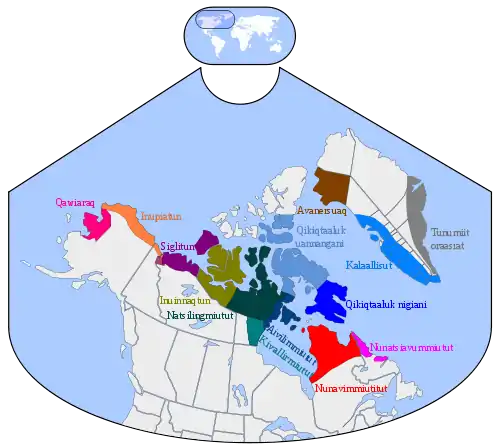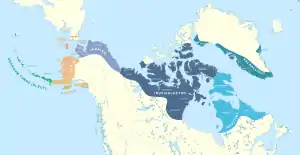Siglitun
Siglitun, is the dialect of Inuvialuktun spoken by the Siglit Inuit. It is mainly used in the Inuvialuit communities of Paulatuk, Sachs Harbour and Tuktoyaktuk.[1] Siglitun was once the principal dialect of the Mackenzie River delta, nearby parts of the coast and Arctic Ocean islands, but the number of speakers fell dramatically following outbreaks of new diseases in the 19th century and for many years Siglitun was believed to be completely extinct. It was only in the 1980s that outsiders realised that it was still spoken.
| Siglitun | |
|---|---|
| Native to | Canada |
| Region | Northwest Territories (Canada), as "Inuvialuktun" |
Eskimo–Aleut
| |
| Language codes | |
| ISO 639-3 | – |
| Glottolog | sigl1242 |
 Inuit dialects. Siglit is purple. | |

Siglitun: Aqana Tuktuuyaqtuumukkabsi
Siglitun is the original dialect of the people from Kitigaaryuit.
It is one of the three dialects, along with Kangiryuarmiutun and Uummarmiutun, of Inuit language grouped together under the label Inuvialuktun.
Vocabulary comparison
The comparison of some animal names in the Siglitun dialect of Inuvialuktun language and Uummarmiutun dialect of the Iñupiatun language:[2]
| Siglitun | Uummarmiutun | meaning |
| siksik | hikȓik | ground squirrel |
| qugyuk | qugȓuk | tundra swan |
| ugyuk | ugȓuk | bearded seal |
| tigiaqpak | itigiaqpak | mink |
| qavviasiaq | qavviatchiaq | marten |
| tigiaq | itiriaq | weasel |
| tatidjgaq | tatiȓgaq | sandhill crane |
| ivugaqpak | kuȓugaqpak | mallard |
| aqidjgiq | aqȓgiq | willow ptarmigan |
| isun’ngaq | ihun’ngaq | jaeger |
| piqtusiraq | pamiuquuq | otter |
